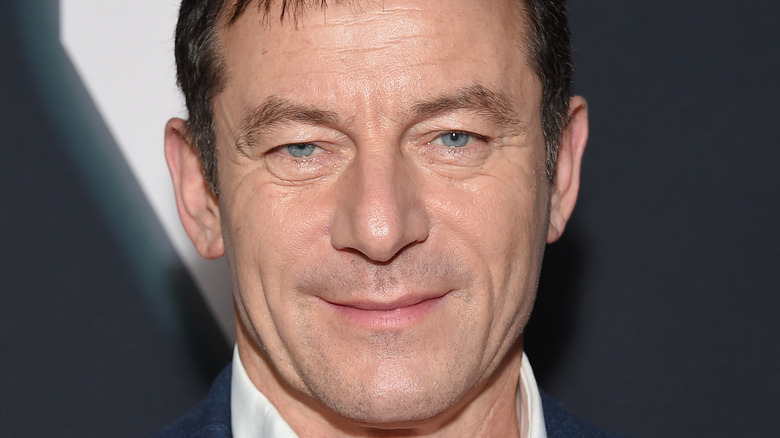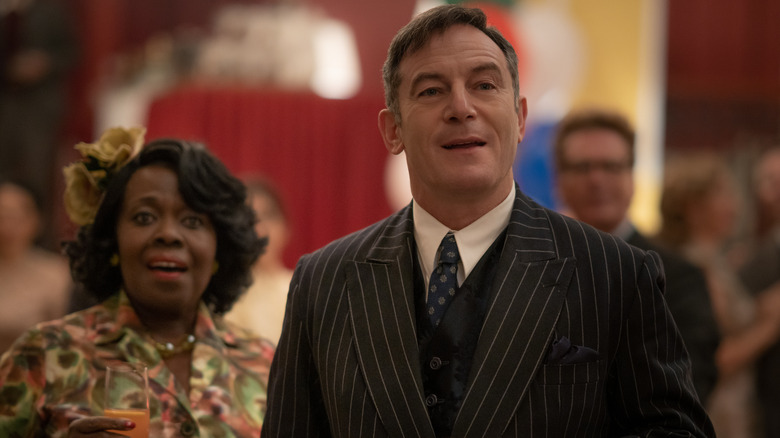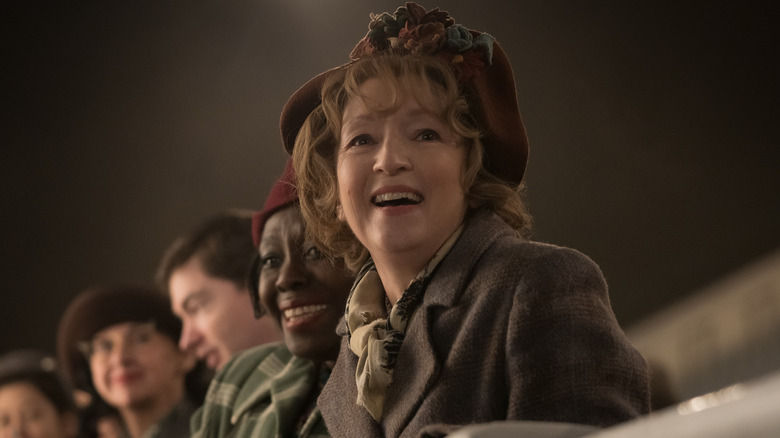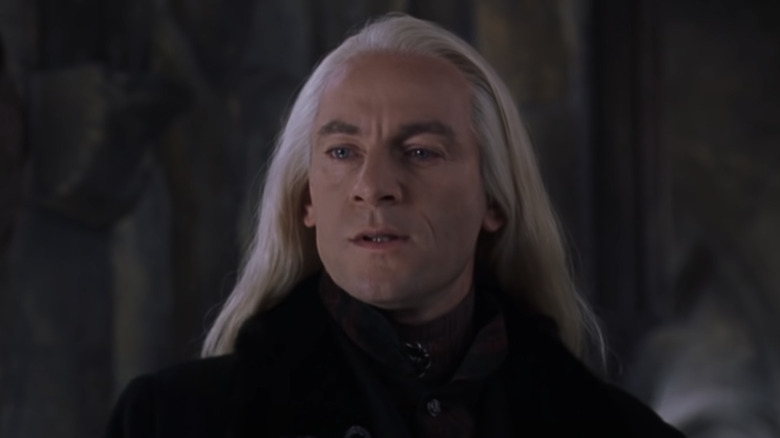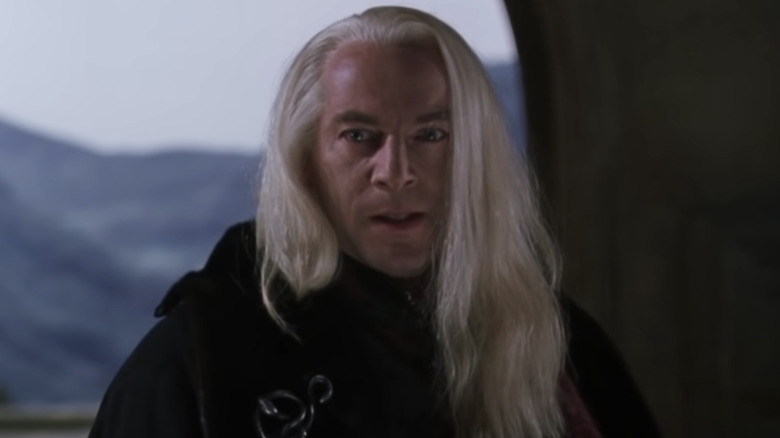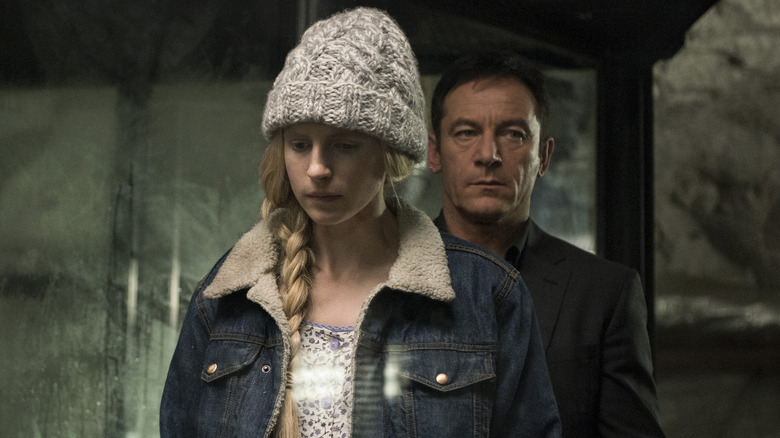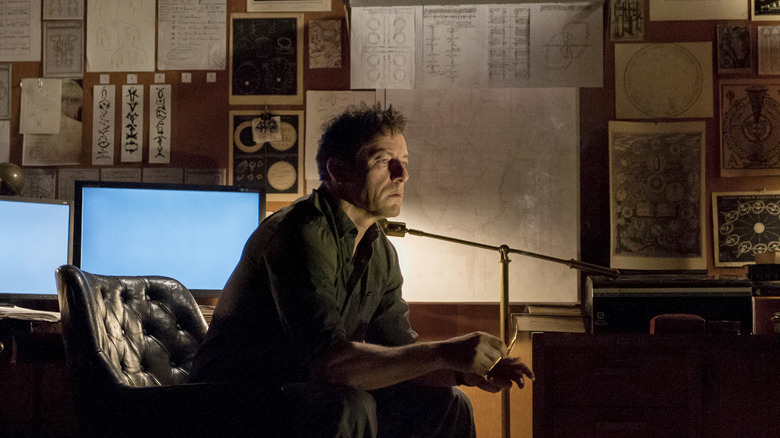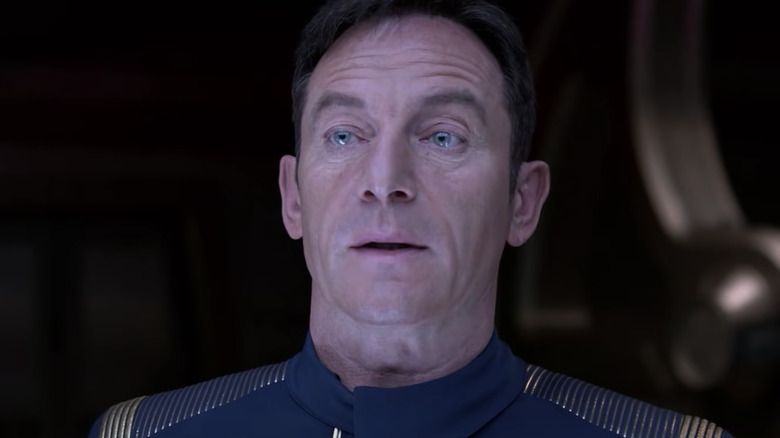Jason Isaacs On Mrs. Harris Goes To Paris And Harry Potter Memories - Exclusive Interview
Jason Isaacs has played a plethora of unforgettable roles, which makes choosing a favorite nearly impossible. While Lucius Malfoy (and his Paris Hilton-inspired wig) in the "Harry Potter" franchise is perhaps Isaacs' most recognizable role, the actor has played everything from a Star Trek Captain in "Star Trek: Discovery" to a psychopathic scientist in Netflix's "The OA," and he's provided his voice for shows including "Star Wars Rebels" and "Avatar: The Last Airbender." Now, the actor is back in "Mrs. Harris Goes to Paris," a comedy-drama set in the 1950s.
"Mrs. Harris Goes to Paris," which hits theaters today, tells the story of Ada, a widowed cleaner dreaming of Christian Dior gowns. After a windfall, Ada finds herself caught up in a Parisian fantasy filled with fashion, romance, and a lot of drama. Isaacs plays one of Ada's friends back in London, who works at a race track and has a sparkle in his eye when it comes to the film's titular character. The film is hilarious, thanks to the incredible performances of its stellar cast, and it also has a good heart, something that's often lacking in cinema today.
The List sat down with Jason Isaacs upon the release of "Mrs. Harris Goes to Paris" to talk about everything from his memories of filming "Harry Potter" to whether he'd ever return to the "Star Trek" universe.
Celebrating the kindness of Mrs Harris Goes to Paris
I love ["Mrs. Harris Goes to Paris"]. It was really surprising. I didn't realize how good it would be. What drew you to playing Archie?
I felt exactly the same. What drew me is that I knew Tony [Anthony Fabian], the director, a little bit. We tried to work together before, it didn't work out. I read this script and the world had just recently... the needle had come scratching off the record badly. The pandemic — who knew where it was going and what was going to happen? Dark clouds were gathering outside the house and inside my head. I read this film, which was seemingly so out of step with the times. [It was] so positive, celebrating this woman, chasing her dreams and being the object of romance, which you don't see of women at that age, and played by Lesley Manville, who I've been an insane [fan] of for decades.
Generally, thematically, it was celebrating compassion and kindness and honesty, and it seemed to be so out of step with the world that I was being kept awake by at night. And then I realized, maybe it's exactly what I needed, because I was having tremendous difficulty. I've got kids, and ... fear was filling my days and nights. Mrs. Harris is such an inspirational figure. It's not like the world is going particularly well for her, and she's very well aware of how strictly stratified society is and where she belongs in the great pecking order of things.
She finds herself during the course of the film, and all the way through, right from the beginning, she's an inspiration for other people without realizing it. Her simplicity, not simpleness, but her simplicity and her directness and her compassion had this ripple effect on everyone around her.
I wanted to believe that was true, and that kindness was possible and necessary. Archie, who at first I thought was going to be some kind of Arthur Daley character; he's a bookie, which seems slightly questionable. He was Irish, although I wanted to make him Northern Irish to be slightly less cliched, and [the director] Tony was happy with that, but still I thought, "Well, at some point he's going to disappoint her. This is a film. At some point, life is going to crush her."
Actually, it's not always true. It's often true in drama that catastrophic things happen to people because that's what we like to watch. We even have a genre of films, disaster movies, that have been so popular, but this was a film about something else and celebrating something else. The power of kindness wins. I felt like it was something I wanted and needed personally, to jump into to remind me that people are capable of these things.
Collaborating with Lesley Manville
That's such a good point. At this point in time, this is the perfect movie because it makes you feel like fashion is attainable for anyone, that these connections and these friendships [are attainable], and also that you can snag a toy boy any time.
I'm not sure that's entirely what this film is setting out to do, but hey, this is art.
No, but you don't always see that on the screen.
You don't see films built around the romantic life of women of Mrs. Harris' age, that's for sure.
You had amazing chemistry with Lesley Manville. What was it like working with her?
The thing about this chemistry thing is hilarious. I don't know if you've come across it much, but in Hollywood and the television film business, they do things called "chemistry reads" sometimes, when they put actors in a room together, either to run lines or have a cup of tea. And then whoever wasn't cast, because the other one is normally cast first, leaves and they go, "What do you think? Did you feel something? Was there chemistry in the room?" ["Mrs. Harris Goes to Paris"] is a beautiful script, beautifully written and beautifully acted. The chemistry was ... it's a great story, and we both fell into those characters.
But the reason that Lesley [Manville]'s such a magnificent actress, [with] a career spanning decades of creating iconic parts, is that she makes connections, and acting is connecting. Any of the quite substantial intimidation I felt before I met her — when I worked with her, [it] evaporated within the first blink, because she was there to be met and to be connected with, to dance with and to fail with and succeed with, and to laugh with and to play with. That's what actors do. We're kids in a sandpit.
I don't know what the chemistry was, but the chemistry is Archie and Mrs. Harris. We were lucky enough that [the director] Tony created an atmosphere where we could find those people together. [The film was] also cleverly put together. The editing and music and costume and sets and camera moves, all of it contribute to this very delicate soufflé rising. Very often it doesn't, but this time it did.
Remembering his time on Harry Potter
A lot of us know you as Lucius Malfoy from the "Harry Potter" franchise. Do you have any favorite memories from working on those movies?
I was in, 2, 4, 5, 7, [and] 8. I was in five of them spread over 10 years. My memory's all of it. My strongest memories are at the end because I'm old. I remember the first day vividly and I remember the last bit. The middle decade is slightly blurry, but I remember when we were shooting the big courtyard sequence at the end, the big battle of Hogwarts [in "Harry Potter and the Deathly Hallows Part 2"] ... because it went on for quite a long time because it rained, so we couldn't shoot. We'd go to work every day and we'd sit about. If it was an American film, people would go back to their trailers, but it wasn't an American film, so we all sat in a big tent with a tea urn full of increasingly solid tea, which the spoons would stand up in, waiting for the tin of biscuits at 11 o'clock to come around, huddled around the heaters.
It was very cold, listening to Julie Walters tell stories about her pig farm and laughing like idiots, and telling filthy showbiz anecdotes to each other. I wanted the rain to go on for months. I wanted it never to end ... I also remember standing there, somebody, could have been the late, great, brilliant and hilarious Helen McCrory, going, "I don't know how you've f***ing taken this for 10 years. I can't tell you." We were standing there for days and days watching Ralph [Fiennes] do his monologue as Voldemort, because [many of] the "Harry Potter" films were [shot] perfectly by David Yates. I think he was given a mandate by Warner Brothers: "These films will be around forever. Let's make them perfect." We filmed from every angle, every size, got it right.
It was days and days, we were standing there watching Ralph. We were all like, "Get on with it." Not that he wasn't doing it brilliantly, but we'd now seen the speech a thousand times. I was feeling a bit sorry for myself, because I had three lines over the next week. I looked over in one corner and there was Jim Broadbent with an Oscar and Emma Thompson, and I can't remember who with an Oscar, Judy Walters with an Oscar, Maggie Smith with an Oscar. I thought, "They haven't got any lines. I can't believe how lucky I am. At least I've got three lines," and it suddenly perked me up for a while.
About that Lucius Malfoy wig...
I remember looking at the call sheet on those days, which is the piece of paper that gets issued in the morning that tells you who's working and what time they're coming in, barely being able to believe still after 10 years that my name was on the call sheet with these people who I admired so much, were so brilliant at their job and who I stood in the rain to try and get returns [last minute theater tickets], to watch on stage. There we were as colleagues huddled around eating [assorted biscuits].
I couldn't believe that these were my acting mates and that we would be a member of a club, the membership would be sealed when we wrapped the last day, and I would forever be part of the club with these people. None of us took it for granted. We were all fans. That's one of the reasons that the films are received with such love — they were made with such love. We all loved the characters, the books, we loved the fans, we loved being part of the culture of it and the message of it. I remember that feeling, looking around going, "No one's doing this as a job." I've been on many films, some of them big, some of them small. No one's being cynical here. There's no cynicism on this set.
Did you know that everyone is Googling "Does Jason Isaacs wear a wig in 'Harry Potter,'" still?
[They are likely] people who know nothing about hair, I feel. It was very strange when journalists would ask me ... because I did many [of the "Harry Potter" films], I was only required maybe two months, every two years on that thing. I did many films and TV series in between in which my hair looked like this or different. People would go, "Is that your own hair?" And I'd go, "Yes, it's a remarkable skill. I can grow it to my waist in about an hour if the sunlight's strong enough."
That's quite magical that people are still Googling it. You probably had no idea at the time that they would be.
When it comes to me, most people are Googling, "Is 'The OA' coming back?" Is that a gag? Are we playing a joke on the audiences by waiting a few years?"
I wish it was a joke.
"Am I really Jason Isaacs or am I Jason Isaacs from 'The OA?'" That's what I get a lot.
Is The OA really over?
I adore ["The OA"] and I was so gutted when it got canceled [after two seasons]. I hate Netflix sometimes because they cancel everything I love.
I don't. They disrupted the entire industry. The people who worked on the show loved it. The Netflix people who worked on the show loved it. They have a different funding model. They have different priorities, and you can't hate anyone for making a business decision. It is what it is. There's no bad people working there. No one did it out of malign instinct. They're making whatever decision they needed to make at the time because of whatever priorities they had. The way we left it, the door certainly didn't close, did it?
No, you left ["The OA"] on such a massive cliffhanger. How can we live with this?
We could do it again in 20 years time. It would still cut.
It would. Did you have a good experience working on that show?
It was amazing. Everything about it was amazing. I just said I was a fan of "Potter." I arrived as a rabid fan of "The OA." I was offered it overnight. I replaced someone who was playing my part, and I got a phone call late at night, asked to read all these scripts, Skyped Zal [Batmanglij], the director, and was on a plane by the time my kids came down for breakfast. By the time I arrived, I thought these were two [co-creators Zal Batmanglij and Brit Marling] of the most talented, creative, imaginative people I'd ever met, and I hadn't even met them. I got there and it turned out they were lovely and completely collaborative about this thing that they'd spent forever writing and were already in the process of directing.
Almost the first thing I said to Zal, I went pretty much straight to Grand Central Station to shoot the opening scene because that's why they needed to replace someone overnight, because they wanted to replace the guy who was maybe the wrong choice for the part. They had the most expensive day of the season coming up the next day, which was Grand Central. Once they shot him there, they were never going to be able to replace him.
I arrived, I met Brit in character on set, and I said to Zal — something about this guy, Hap [Dr. Hunter Aloysius 'Hap' Percy] — I said, "Do you think he might..." I don't remember what the question was specifically, but I remember his answer. He said, "I don't know. You know him much better than I do. What do you think?" It was one of the most generous and creative and brilliant things I've ever had a director say to me. I've directed since, and I wish I had the courage to do that to the actors I work with.
On the 'extraordinary' cast and crew of The OA
It's a testament to the work you did [on "The OA"], because it really does feel like the character is you.
They are in a parallel universe when it comes to the fearlessness of their imagination, and how they don't have the ability in their DNA, they couldn't reach for a cliché if they were paid, if they were begged to do it. And it all, oddly, for a series which is so — sorry to be serious — which is so fantastical, dealing in fantasy and parallel universes and stuff, it sounds like an odd thing to say, but it's rich with their integrity, their authenticity. They didn't write anything at all they thought was clever or weird for the sake of it. There's none of the "Twin Peaks" stuff in it, which is self-consciously and entertainingly bizarre. ["The OA" has] a talking octopus, because they'd been reading books about octopuses and how they might have been the most intelligent creatures on earth and stuff.
There are many things I admired about them. Mostly, as people, they are extraordinary to work with. Also, to take a first season, — which is as successful as "The OA" was, and it seemed to be everywhere I went, and it's still often the thing journalists want to talk about the most — and instead of doubling down in Season 2 and writing more of the same, they took that, they were empowered, enabled by it so that their imaginations fly and make a season in a completely different genre. [They're the] same stories, another piece of the mosaic, which they had built before they started all of it.
You don't see other series do that. You see other shows going, "Well, I know what the audience likes. Let's give more of that," and [ the "OA" writers] went, "I know where I want to go and these people are on the journey with us." I loved that piece. We were all heartbroken when it was canceled, but we're aware that the door's not shut.
Reviving Captain Lorca?
I also need to get in a question about "Star Trek: Discovery" because you are my favorite captain.
Captain Lorca. Is the door shut on Prime Lorca? That's a question that's live on the internet, that's for sure.
What was it like working on that show? And could you see a return to the "Star Trek" universe?
Sure. Yeah. The story would have to be great. It was a fantastic storyline. All actors ever want is a secret, and I had the biggest secret of all, without spoiling it for anyone. If people haven't watched it already, it's unlikely they'll watch it now, but there is nonetheless a fantastic secret, and I had it to play, and I knew it. Iit means that when you watch it, like when you watch "The Sixth Sense" for a second time, there's a whole new layer of enjoyment to be had when you know what things turn out to be.
Prime Lorca is... I'm working with Akiva Goldsman right now, who wrote and directed quite a lot of "[Star Trek]: Discovery," on a Tom Holland mini series, "The Crowded Room" in New York. We've talked about Prime Lorca, and it would have to be as good a story as Season 1 of "Discovery." I don't want to come back just because he's a fan favorite and do some version that isn't anywhere near as good. If there's space, they have so many brilliant series up now. "Strange New Worlds" has been a massive hit as well, and "Picard" is a huge hit, but where and if there's space for a Prime Lorca arc, I'm all up for it. I don't want to come back just to squeeze into that sausage skintight suit.
You also do a lot of voiceover work, and I know you recently voiced Alfred on a "Batman" podcast. Do you have any superhero or supervillain dreams? Is there a particular role you would like to play?
I played Superman in a thing called "Superman Under the Red Sun," which was a brilliant comic. I've also been Raʼs al Ghul, I've been Lex Luthor. I've been Dick Dastardly now. [I was] in "Scoob" ... I've played a lot of superheroes and supervillains.
You have in voice work, but I want to see you in the MCU, in the DC Universe.
Oh, on the screen? I've got a number of mates in the Marvel films. There's a lot of eating broccoli and chicken and going to the gym involved. No, I love the films. I've seen every single one of them, and I do love them. Even the TV series actually, a lot of the TV series. Charlie Cox, a mate of mine, I thought he's amazing as Daredevil and [I'm] thrilled that he's coming back, but I don't know if I could put that much time in, in the gym. I feel like I'm on the conveyor belt. It's moving fast towards the Pearly Gates or else the fiery pit. I don't know if I can do the two or three hours a day that it requires.
Ask them to do CGI. It'll be fine.
When they can do the CGI muscles, I'm all in for it.
"Mrs Harris Goes to Paris" is now playing in theaters. Book tickets now.
This interview has been edited for clarity.
